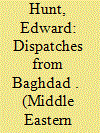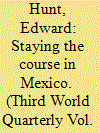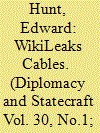|
|
|
Sort Order |
|
|
|
Items / Page
|
|
|
|
|
|
|
| Srl | Item |
| 1 |
ID:
174145


|
|
|
|
|
| Summary/Abstract |
When the dissident media group WikiLeaks published more than a quarter-million US diplomatic cables from 2010 to 2011, it included thousands of cables written by US diplomats involved in the War in Iraq (2003–2011). Although the scholarly literature covers many aspects of the war from the perspective of US officials, it has largely excluded the viewpoints captured by the WikiLeaks cables. In this article, I use the cables to reveal the thinking of US diplomats during one of the most violent phases of the war, the sectarian war, which peaked from 2006 to 2007. The cables document the sectarian cleansing of Baghdad from 2006 to 2007 and provide new information about the factors that caused the rise and fall of sectarian violence. The cables show that US actions contributed to the sectarian violence.
|
|
|
|
|
|
|
|
|
|
|
|
|
|
|
|
| 2 |
ID:
166699


|
|
|
|
|
| Summary/Abstract |
With drug-related violence reaching record levels in Mexico, there has been growing debate over its causes. US and Mexican officials blame many factors, including problems with their strategy in the drug war, fighting among cartels, corruption in police forces, an ineffective legal justice system and US drug demand. In this paper, I argue that the Mérida Initiative, a multi-billion dollar programme of US assistance, is an important additional factor. Drug-related violence increased in the years after the implementation of the Mérida Initiative, declined when Mexican officials paused new programmes in 2012 and increased again as US and Mexican officials implemented new Mérida programmes in the following years. Over the same time period, drug-related homicides and complementary counternarcotics assistance from the US Department of Defense are positively correlated. Using US records, I show that US officials have been willing to overlook the growing violence because they have been more focused on achieving their economic and strategic objectives. I conclude that their actions have played a significant role in increasing drug-related violence while starting an ominous new phase of US imperialism in Mexico.
|
|
|
|
|
|
|
|
|
|
|
|
|
|
|
|
| 3 |
ID:
164577


|
|
|
|
|
| Summary/Abstract |
The disclosure of more than 250,000 American diplomatic cables by the dissident media organisation WikiLeaks in 2010–2011 gained much attention in the American mass media but generated little interest for diplomatic historians. A small number of scholars explored small parts of the archive, but diplomatic historians and political scientists largely dismissed the cables as insignificant source material. These scholars overlooked important primary sources. The cables provide important revelations about American actions in every region of the world, especially between 2001 and 2010. Although United States officials and their supporters in the American mass media insisted that the cables showed American diplomats performing admirable work, the cables reveal how the United States exploits the world.
|
|
|
|
|
|
|
|
|
|
|
|
|
|
|
|
|
|
|
|
|